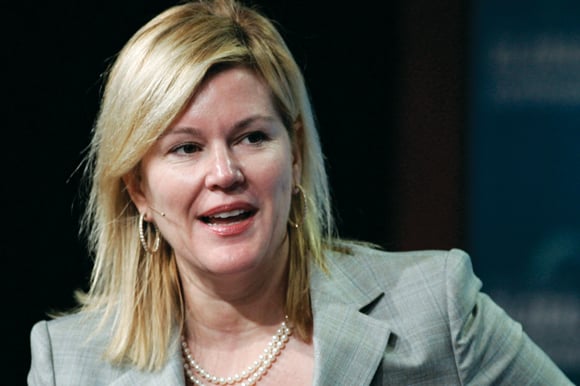Meredith Whitney's at it again. The controversial analyst is now predicting a 'waterfall' of muni downgrades which will trigger a massive sell-off by insurers. If she's right, investors may be able to pick up some bargains in the process.
There will be a “waterfall” of credit-rating cuts in the $2.93 trillion municipal debt market as rating companies scrutinize state and local off-balance sheet liabilities, said Meredith Whitney, the banking analyst.
The downgrades will force investors such as insurance companies to sell the securities, presenting an opportunity for other bond buyers, Whitney said on a radio interview today on “Bloomberg Surveillance” with Tom Keene. The analyst fueled a sell-off of tax-exempt debt when she said on CBS Corp.'s “60 Minutes” in December that there could be 50 to 100 “sizable” municipal-bond defaults in 2011 amounting to “hundreds of billions of dollars.”
“Once these municipal bonds get downgraded, there will be forced selling by the insurance companies,” said Whitney, who founded New York-based Meredith Whitney Advisory Group LLC in 2009 after leaving Oppenheimer & Co. “Then you'll see an opportunity to go in and buy quality issues because there'll be indiscriminate selling.”
Investors have withdrawn about $47 billion from U.S. municipal-bond mutual funds since Nov. 10, according to Lipper US Fund Flows, a Denver-based research company. Tax-exempt bonds had their worst quarterly performance in 16 years in the final three months of last year, losing 4.5 percent, according to the Bank of America Merrill Lynch Municipal Master index, which accounts for price changes and interest income.
The withdrawals have slowed in recent weeks after the pace of municipal bond sales fell and state tax revenue began to improve. Rates on top-rated tax-exempt bonds due in 10 years reached 2.6 percent on May 18, the lowest since Nov. 12, while the index for insuring against the default of $10 million of municipal bonds for five years was $124,725 yesterday, down from $235,940 on Jan. 7.
Whitney, who correctly predicted Citigroup Inc.'s 2008 dividend cut, said she wouldn't personally buy municipal bonds yet. She declined to say when it would be a good time to purchase the securities.
“Despite the fact that there have been retail withdrawals from the municipal market, there really hasn't been that much,” she said. “It's just that nothing has gone on in the municipal market for so long. A little activity seems like a big deal.”
The analyst stood by her forecast for municipal bond defaults, even as the latest data has yet to back her up.
There were nine municipal defaults totaling $254 million in the first three months of this year, down from 22 totaling $1 billion in the same period last year, according to a newsletter published by Income Securities Advisor in Miami Lakes, Florida. Defaults peaked in 2008 at $8.2 billion, including rated and unrated debt, the company said.
“In the cycle of this municipal downturn, I stand by it,” she said.
--Bloomberg news--







